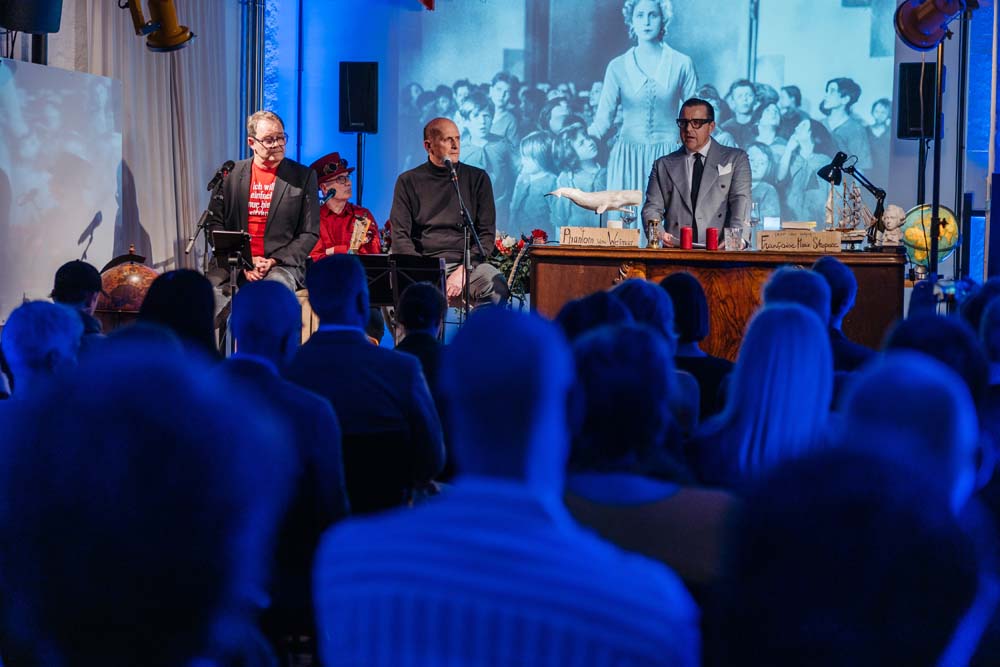
14 Apr On the nature of innovation
Is technology a self-curse, innovation a dogma, progress a religion and the future superstition?
It’s too late to be a pessimist, let’s form an alliance here and now, an alliance for a permanently good present, a pact for the best of all possible worlds. Raise a glass with me and toast to Fortuna: to what is to come, what is common and what is good.
On March 26, DELTA AG hosted the opening of the Grand Salon and one of the most unforgettable evenings in DELTA’s history. With over 100 actors and top-class guests, we enjoyed a fine evening of intellectual charm, humor and profound exchange. I opened the event with the masterpiece METROPOLIS: Thea von Harbou wrote METROPOLIS in a moment of foreboding. A disturbing work in every respect. Her husband, Fritz Lang, turned it into a monumental science fiction silent film in the style of Expressionism. The setting is a futuristic metropolis, METROPOLIS – the city of cities. A giant technocratic city. A networked non-place. A concrete Moloch. No novel or movie is more contemporary than Metropolis.
At a time characterized by uncertainty, climate catastrophes, social differences, financial crises and technological upheaval, fear is spreading among people. Artificial intelligence, which is gradually penetrating all areas of life, is not alleviating people’s concerns. This is why many are asking the question “will it rule us?” We are optimistic about the future of technological progress in innovation and are opening the Grand Salon – a place of good living, inspiration and new beginnings. We shape innovation, progress and the future. We face the future not with skepticism, but with attitude.
The evening was hosted by me – the Phantom of Weimar and the Count of Hagia, Franҫoise Strapace alias Bernd Waß – the philosopher and watchmaker. Waß fragt Müller was the program. We philosophized together with the guests about the nature of innovation. The lawyer, blogger and influencer Martin Schiefer talked about innovation. Futuristic urban developer and DELTA CEO AG Wolfgang Kradischnig discussed his specialty of progress and we philosophized together with futurologist and sociologist Christiane Varga on the topic of the future. The band Die Feine Mischung provided the musical accompaniment. Guitarist of the band and journalist of the OÖN Reini Gruber asked the somewhat critical questions to the guests. The Grand Salon should serve as a forge where we bring together different formats and start an experiment that encourages further thinking, further development, exchange and networking as well as philosophizing and discussing. Not only the experts were asked about the central concepts of the evening, but also the philosopher and Count von Hagia. How are the concepts of innovation, progress and the future viewed from a philosophical perspective?

(c) Mac Greene Photography
What can we say about the concept of innovation from a philosophical perspective?
The Count of Hagia: Indeed, dear Phantom of Weimar. In philosophy, we try to understand the world by thinking. But thinking – as Leibniz emphasized long before Humboldt – is based on language, unlike perception. Why? In contrast to the immediacy of perception, thinking is abstract. We perceive something – we think about something. In thinking, we are therefore always one step away from the world of the moment. And the bridge with which we are able to overcome this gap in our relationship to the world is language. The expressions of our language – its concepts – are representatives of things (including states and processes) in the world. And so we can relate to the world through language, even when we do not have it in front of us, we can relate things to each other, separate them from each other, rearrange them completely, move from one to another, add something, remove something and much more. – grasp them in the truest sense of the word.
This means that the realm of concepts lies between our thinking about the world and the world itself, and we must master this realm if we want to understand the world. But we also need to master it if we want to be effective in our companies. If, for example, I have no idea what the term innovation means, then talking about it will at best lead nowhere and at worst lead us astray.
What does the term innovation mean? What are we talking about when we talk about innovation?
The Count of Hagia: According to the German dictionary, there are two relevant meanings: Innovation – incidentally derived from the Latin innovare (to renew) – thus means a) a planned and controlled change in a social system through the application of new ideas and techniques.
b) the realization of a novel solution to a specific problem, especially the introduction of a new product or the application of a new process.
We must therefore roughly distinguish between social or societal renewal on the one hand and technical and economic renewal on the other. Depending on what we are talking about, we will get very different results and have to overcome very different challenges. What is remarkable, however, is the fact that every innovation has to produce its own prerequisites for validity itself, so to speak, by gaining recognition through a process of creating social meaning. Innovation is therefore not completed with the creative act of creation. Without recognition by the addressees of the innovation, it is nothing. On the other hand, it can also be much more than the creators of the innovation themselves had in mind. Thomas Alva Edison, for example, originally only wanted to use the telephone for opera broadcasts.
You could perhaps say that innovation implies three dimensions: The innovators (the creative creators, if you will), the addressees of the innovation and the process of creating meaning. And you have to keep all three dimensions in mind.
Would you agree with me, dear Count, if I said that all innovation can be subsumed under the concept of progress?
The Count: I agree with you, dear Phantom. Which brings us, so to speak, to the next concept to consider in connection with innovation: the concept of progress. So what are we dealing with here?
The German social philosopher Axel Honneth (Frankfurt School) would say that progress is a history of indignation. And it is the story of the indignations of the excluded.
However, I would like to discuss a different version of the concept of progress with you today.
In his essay “Time and Finitude”, the German philosopher Odo Marquard articulates a thought that modern man may not like to think about, but which constantly forces itself upon us in our sense of unease: Our world of progress displaces human slowness and therefore constantly a part of what we are fixed to as temporal beings. What remains is only the fast pace of life. The pace of innovation and the speed of change are increasing, more and more. The modernizing forces of progress neutralize the world of tradition as a world of familiar surroundings. Only in this way – neutral to tradition – can modern technology form artificial functional realities faster and faster; only in this way – neutral to tradition – can the modern economy turn its products into goods for global trade faster and faster; only in this way – through tradition-neutral communication systems – can modern information technology make more and more information globally communicable faster and faster.
It cannot be denied that this fast-paced world brings advantages in life. But it is also impossible to deny that it increasingly exhausts us because it turns us into strangers who are barely able to find their bearings. The fact that people – because their time is finite, because they have a time limit – not only have to live fast, but also have to compensate by living slowly, in relation to their origins and in familiar circumstances, may not really make sense to those who believe in progress. You could say: the faster the rate of progress, the slower we have to live.

(c) Mac Greene Photography
Would you agree with me again, dear Count, if I were to claim that all progress, and thus implicitly all innovation, can be subsumed under the concept of the future?
The Count: I agree with you again, dear Phantom. Innovation and progress have the same goddess. Which brings us to the common denominator of innovation and progress: the future. But from a philosophical point of view, both innovation and progress fall into nothingness. This is because the future does not exist. At least not if you believe the great Augustine: for Augustine, the future is an aspect of time, just as the past is an aspect of time.
But from the point of view of the directly experienced moment – and we have no other point of view – the future always does not yet exist and the past always no longer exists – in other words, both never exist. What really exists is only the present.
At the same time, however, it seems outrageous to deny the future and past as ingredients of experienced reality at all, which is why Augustine links them to the present: He speaks – in addition to the present of the present – of the present of the past and the present of the future. The key to understanding this concept of time is memory and imagination. The past is nothing other than the remembered present and the future is nothing other than the imagined present.
This is the big bang: the concept of the future as mere imagination – we have spoken of the imagined present – strips it of everything it likes to adorn itself with. The veil of maya is lifted: the mystical, the dark, the fateful and the hidden are revealed to be deceptive. For what remains is transparent insofar as it is clear who is in control: we – as individuals, as a society, as an organization, but also as humanity. If the future is the idea of the present, then it is nothing other than a reality that we have imagined ourselves. Because imagining and thinking coincide. You only have to try to imagine a sphere, for example, without thinking about a sphere, to see what is meant.
The world we will live in tomorrow therefore depends on what we think about today, or in other words: how we imagine tomorrow today.
Mr. Graf, now that we have established that innovation, progress and the future are connected. What is the essence of innovation?
The Count: I think the essence of innovation, dear Phantom, lies in man himself. Man is not only a profoundly creative being, but also a socially active being. And so we are constantly busy innovating, renewing and improving what we do.
We ended the fabulous evening with stimulating conversations and inspiring perspectives on the topics of innovation, progress, the future and not forgetting how they are viewed from the perspective of philosophy together with the guests and visitors. Thank you all for being part of an epic evening!








































































